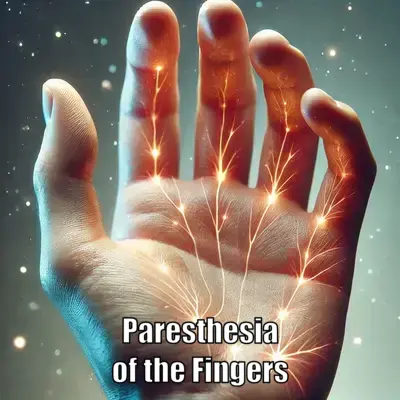Case Start: Meet Carla, a graphic designer in her mid-thirties. Recently, she started feeling a strange tingling sensation in her fingers, like they were falling asleep, even when she wasn’t putting pressure on them. The sensation sometimes grew into numbness or a prickling feeling, which made it difficult for her to work on detailed designs. Carla, like many others, is experiencing paresthesia of the fingers—a condition characterized by tingling, numbness, or prickling sensations in the fingers.
Symptom Breakdown:
Paresthesia of the fingers can show up in various ways, but most commonly, people describe the sensation as:
- Tingling in the fingers: A feeling similar to “pins and needles” that may last for a few seconds or longer.
- Numbness: Loss of sensation in the fingers, making it harder to grip or hold objects.
- Prickling or burning sensations: Some may feel as though their skin is being lightly pricked or burning.
- Weakness in the hands: Paresthesia can sometimes be accompanied by muscle weakness or difficulty in performing fine motor tasks.
Diagnostic Path: What Causes Paresthesia of the Fingers?
Understanding the causes of paresthesia can help in finding the right treatment. Several factors can contribute to the development of tingling or numbness in the fingers, and it’s important to know which one might be affecting you. Here are some of the most common causes:
- Nerve Compression (Carpal Tunnel Syndrome):
One of the most frequent causes of finger paresthesia is carpal tunnel syndrome. This happens when the median nerve, which runs through the wrist, gets compressed, leading to tingling and numbness in the fingers, particularly the thumb, index, and middle fingers. - Diabetes:
High blood sugar levels can damage nerves, leading to diabetic neuropathy. When it affects the hands, you might feel tingling or numbness in the fingers. This condition is more common in individuals with long-standing diabetes. - Vitamin Deficiency:
A deficiency in vitamins, especially vitamin B12, can lead to nerve damage, which manifests as paresthesia. People with poor diets or absorption issues may experience tingling in the hands and fingers as an early symptom. - Cervical Spine Issues (Pinched Nerve):
Problems in the neck, such as a herniated disc or pinched nerve, can send tingling sensations down the arms and into the fingers. This is often accompanied by neck pain or stiffness. - Peripheral Neuropathy:
Peripheral neuropathy occurs when nerves outside the brain and spinal cord are damaged. It’s often caused by conditions like autoimmune diseases, infections, or exposure to toxins. Paresthesia is a key symptom of this condition.
Deep Dive: Understanding Nerve Damage and Paresthesia
When you experience paresthesia, it’s often because something is affecting the nerves that send signals from your fingers to your brain. In carpal tunnel syndrome, the compression of the median nerve disrupts those signals, leading to a mix of sensations like tingling or numbness. Similarly, if a nerve in the neck is pinched, it can send these abnormal signals down the arm to the fingers.
The longer the compression or damage to the nerve continues, the more persistent the paresthesia becomes. This is why early diagnosis and treatment are crucial to prevent long-term damage and possible muscle weakness.
Treatment Comparison: How to Address Paresthesia in Fingers
The treatment for finger paresthesia depends on the underlying cause. Here are some common approaches:
- Treating Carpal Tunnel Syndrome:
- Wrist braces: Wearing a brace to stabilize your wrist, particularly during sleep, can help relieve pressure on the median nerve.
- Surgical options: In severe cases, surgery to release the nerve might be necessary, especially if conservative treatments don’t work.
- Managing Diabetes:
- Blood sugar control: Keeping blood sugar levels within a healthy range can prevent further nerve damage.
- Medications: If diabetic neuropathy is severe, medications that target nerve pain may be prescribed.
- Vitamin Supplementation:
- If a vitamin B12 deficiency is causing the paresthesia, supplementing with B12 can help repair nerve function.
- Physical Therapy:
- Neck stretches and exercises: For those with cervical spine issues, physical therapy focused on neck mobility and strength can relieve pressure on the nerves.
- Occupational therapy: Learning proper hand and wrist movements can help those suffering from carpal tunnel syndrome or other repetitive strain injuries.
- Surgery or Intervention for Nerve Compression:
- For severe cases, such as herniated discs or severe nerve compression, surgical intervention might be necessary to alleviate pressure and restore normal nerve function.
Outcome Story: Finding Relief
Take David, a 50-year-old accountant who started experiencing tingling in his fingers after years of working long hours at a desk. The sensation began as mild, but soon his fingers felt constantly numb, making it difficult to type. After visiting a specialist, he was diagnosed with carpal tunnel syndrome. Following a few months of wearing a wrist brace and undergoing physical therapy, David saw significant improvement. He was able to manage his condition and return to work without discomfort.
Conclusion: Don’t Ignore the Tingling
Paresthesia of the fingers, whether caused by carpal tunnel syndrome, diabetic neuropathy, or other factors, can severely affect your daily life if left untreated. By addressing the root cause early—whether through lifestyle changes, physical therapy, or medical treatment—you can prevent further nerve damage and find relief from those nagging symptoms. If you’re experiencing persistent tingling or numbness in your fingers, it’s important to consult with a healthcare provider for proper diagnosis and treatment.









